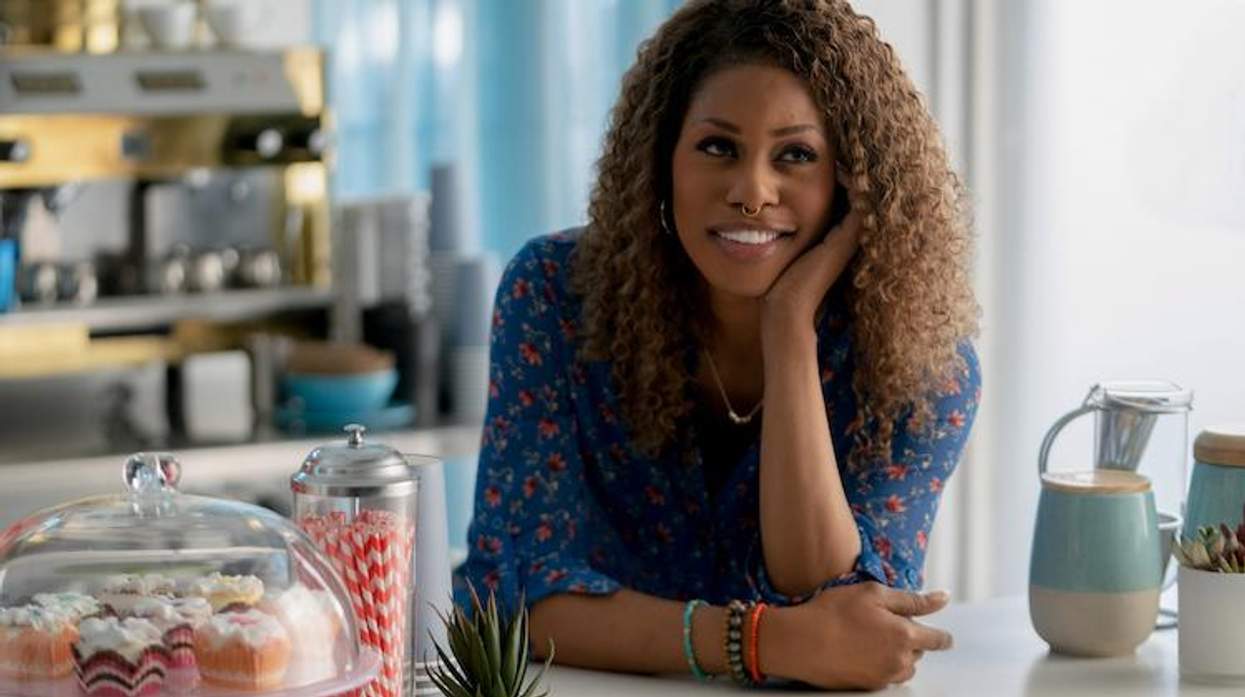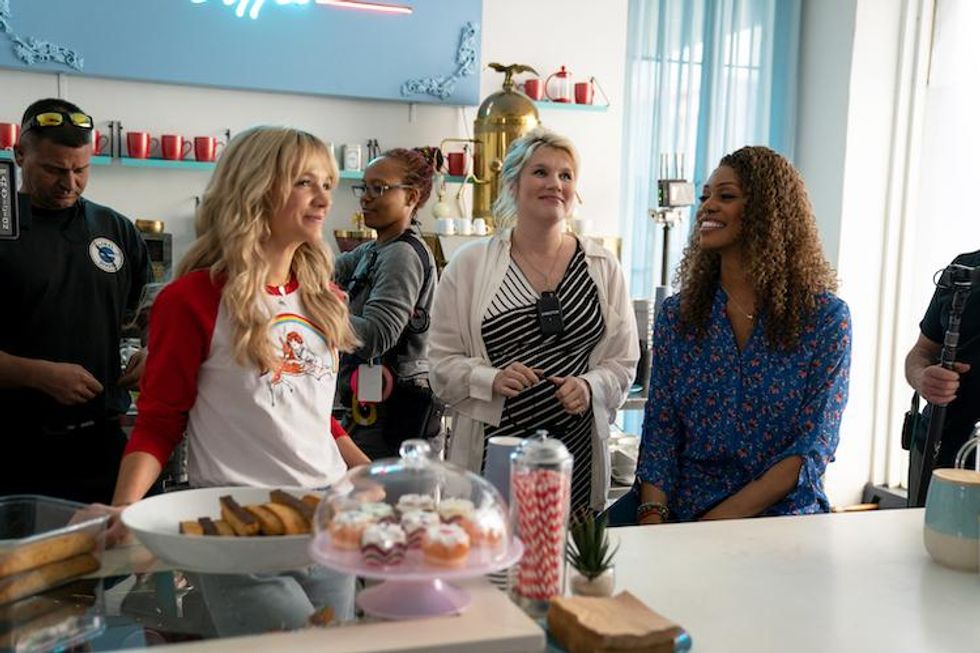A few minutes into Promising Young Woman, Carey Mulligan's seemingly wasted Cassandra is in the back of a rideshare with a guy she met at a club. He's promised to deliver her home to safety but instead takes the woman who can barely walk up to his place for a nightcap. Once there, Cassie, suddenly very alert, flutters open her eyes at an opportune moment and thwarts her would-be assaulter.
Without spoiling the plot of the film from writer-director Emerald Fennell (Killing Eve), it can be revealed that Promising Young Woman is a revenge movie that is also a far cry from the assault/revenge movies of the 1970s like Death Wish in which an avenging male lead goes after a deranged predator. Fennell's film doesn't focus on a single psychopathic abuser or group of bad guys. Instead, it castigates an entire culture that feeds into allowing "nice guys" to perpetrate sexual abuse without fear of repercussion. Fennell's script digs into the complicity around that culture. And Laverne Cox, who plays Cassandra's employer and friend Gail, wanted in on the project as soon as she read the script.
"I read it in less than 90 minutes. I emailed my agent and manager, and I was like, 'I have to be in this project, no matter what. ... I don't care how big the role is,'" Cox tells The Advocate. "The script was smart, funny, a page-turner, unexpected, just wow. I was completely blown away and knew I had to absolutely be a part of it, no matter what."
Cox, who made history in 2014 as the first transgender person to be nominated for a Primetime Emmy Award in an acting category for her role on Orange Is the New Black, weighs in on Fennell taking on, not only the perpetrators of assault but also those who stand idly by.
"I love it. And what I love about it is that I think it encourages the men who watch [the film] and the women as well, I think it encourages everyone who watches to maybe rethink what we think nice guys are, what we think it means to be a nice guy in these kinds of situations," Cox says. "I think what's also beautiful is that we see women who've been complicit. No one's really let off the hook in this film, right?"
The movie sees Cassandra continually battling the trauma of losing her friend Nina to the fallout from an assault she endured while they were both in medical school. To avenge her friend's assault, Cassandra spends days working at the coffee shop with Gail and nights roaming the city's clubs to ensnare a guy who'll attempt to take advantage of a woman in a compromised state. And it's not hard for her to find them. A diary she keeps of her project shows there's no shortage of men who'll cross a line.
"The only way that 'rape culture' sort of is perpetuated is by a lot of people being complicit. Not just men," Cox says of the film's willingness to take on the entire structure. "I think, brilliantly, Emerald tells that story, and I am immensely proud to be a part of a story that is so beautifully human, real, and necessary."
Fennell's dark subject matter is juxtaposed with Cassandra's often candy-colored costumes and the soundtrack, both of which create a heightened sensibility. Certainly, Cassandra is on high alert, and no one who is complicit gets a pass. She takes on an old med school friend (Alison Brie) who did nothing to stop the assault, and later the dean of the school (Connie Britton) who allowed Nina's abuser to walk under the auspices that too many young men's lives are ruined by accusations.

Carey Mulligan, Emerald Fennell, and Laverne Cox on set
Cassandra's parents, played by Jennifer Coolidge and Clancy Brown, are at a loss to help their daughter and fumble in doing so. There's a glimmer of hope when Cassandra reconnects with and begins to fall for Ryan (Bo Burnham), an old friend from medical school. But it's Cox's Gail who with her witty rejoinders and steady presence is Cassandra's North Star throughout the film -- even if she can't save Cassandra from path she's treading.
Cox was cast for what she would bring to the role rather than because of her being trans.
"There was something about my talent and what I have to bring that Emerald wanted in her film. That just means the world to me. And it's about the talent and it's about the energy and what one has to bring, and not about identity," she says.
A discussion of Promising Young Woman and its excoriation of a culture that allows for systemic abuse inevitably leads to the violence perpetrated against trans people. A few weeks before the film's release, Cox was targeted in a transphobic attack while walking with a friend in Los Angeles's Griffith Park. She breaks down the culture that leads to violence against trans people.
"A lot of the violence we see against trans people is intimate partner violence -- a lot of the violence happens in the context of a man being attracted to a trans woman on the street, right? It's him realizing that she's trans or one of his friends realizing she's trans and then harassment happening or something far worse happening.
"I talked a little bit about what happened to me at Griffith Park a few weeks ago. I think a lot of the reason the incident happened is because the guy was really looking at me and really checking me out and asking if I was a guy or a girl. He wanted to confirm that indeed he was attracted to someone that he could confirm for sure was a girl, by whatever metric he's using to define gender.
"A lot of times what is happening in these situations is that in the culture of toxic masculinity, men want to be able to be womanizers, to catcall women on the street, and be absolutely positively sure that the women they're catcalling on the street are cisgender women," Cox says. "So then we must make trans women not exist so that there is absolutely no chance I'm attracted to her. Because the reality is that men who are attracted to women, some of them will find themselves attracted to trans women because trans women are women."
Now that Promising Young Woman is available in some theaters and on video on demand, Cox hopes that it will take kick-start conversations in the wake of #MeToo. One place that needs to happen is in Hollywood, which she says has perpetrated dangerous messages around consent.
"The backlash really began to sort of run the #MeToo conversation, and we haven't really gotten to a place to have real conversations around accountability, how parents can have conversations with their children, with their sons, specifically, about what consent is and what it looks like," she says.
Promising Young Woman exposes those lines that are often blurred around consent, Cox says.
"Sometimes people understand that they're sexually assaulted, right? When people drug people, I think that's really clear. And if someone's blackout drunk, you should understand it too. But I think sometimes the signals are not clear for men, for whatever reason, and that's my most generous read on that," she says.
"I think there are a lot of mixed messages that have been sent culturally in film, that when a woman says no, she means yes. There are how many films that we've seen over the years that sort of perpetuate that myth?" Cox says. "I know the industry's changing, but there's a lot of work we have to undo to really have a better culture around consent. My hope that happens with this film is that we can really begin to have those conversations better."
Focus Features' Promising Young Woman is available on VOD now.






































































Charlie Kirk DID say stoning gay people was the 'perfect law' — and these other heinous quotes